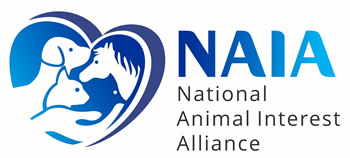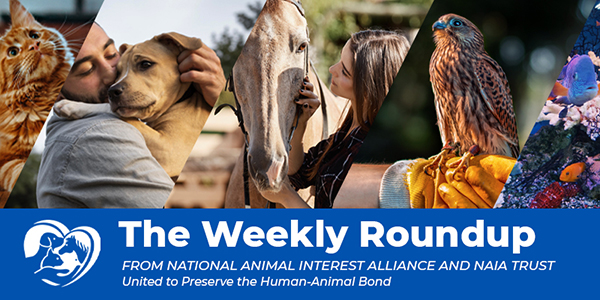
Inside This Issue:
- Lawsuit Filed Against NYCLASS for Its "Smear Campaign" Against Carriage Horse Drivers
- A Retirement Community for the Birds
- Horrific Die-off of Southern Elephant Seals Latest Chapter in Bird Flu Saga
- Japan Enlisting Beagles to Sniff Out Invasive Fire Ants
- Polar Bear Mauling, Hoarding with a Happy Ending, and More!
Lawsuit Filed Against NYCLASS for Its "Smear Campaign" Against Carriage-Horse Drivers
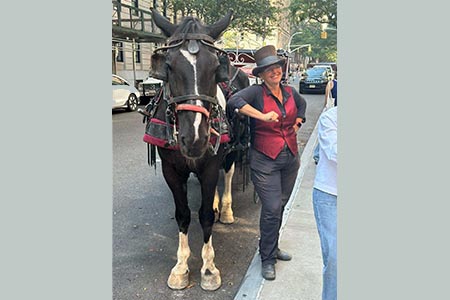
Christina Hansen and Oreo at the Blessing of the Animals at the Church of the Resurrection on the Upper East Side.
Big horse carriage news out of New York City this week: the Transport Workers Union filed a lawsuit against NYCLASS, an animal rights group that has been long-obsessed with banning carriage horses from Central Park. The lawsuit alleges a massive smear campaign of “repeated malicious misrepresentations about the drivers and their treatment of their horses”) and seeks over $1 million in damages. It also lays out NYCLASS’ real-estate ties and its interest in the property that the carriage horses occupy. What’s that? Business interests piggy backing on animal rights causes in order to further their agenda? Say it ain’t so!
It is great seeing carriage horse workers on the offensive, rather than forced to work from a defensive posture. To business interests, a million dollars isn’t huge, but this still sends a message that they have to play fair. If someone has some kind of moral or aesthetic issue with horse carriage rides, that’s fine – it’s their life. In fact, opposition to working animals, no matter how well loved and cared for they may be, is part of the animal rights philosophy. Again, while we strongly disagree with that particular belief system, it’s a free country. Go nuts. However, it’s not OK to misrepresent facts and demonize others while campaigning for your cause, trying to change laws, and affecting the passion and livelihoods of others – no matter how righteous you believe yourself to be (or how valuable a particular piece of real estate may be).
Given the decades of harshly negative campaigning the carriage horse industry has faced, the drip-drip-drip of which has inarguably affected public opinion, it is going to take more than a lawsuit to turn the tide. If you remember, Ringling Brothers won a massive and well-deserved RICO lawsuit against several animal rights groups in 2014. Unfortunately by that late date, public opinion had already been swayed too far and for too long for it to count as anything but a moral victory.
A Retirement Community for the Birds
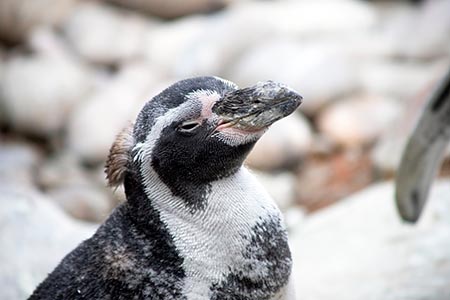
Wise old bird.
Are retirement communities for the birds? Well, sometimes they most definitely are! When Lambert, a 33-year-old African penguin at the New England Aquarium, began to lose his vision and slow down, staff knew it was time for special accommodations. Given that African penguins are critically endangered and have unique needs as they age, Lambert could not simply be relocated anywhere, so the aquarium created a dedicated geriatric island for Lambert and six other elderly penguins, so they could “retire” peacefully while staying with their companions.
The new habitat is designed to fit the birds’ age-related needs. It features flatter surfaces, a carpeted pathway to help the birds move safely in and out of the water, and easy access spots so they can enjoy swimming even as they slow down. Keeping older penguins together in one space also encourages the social connections that are important for their well-being, letting them continue to interact with their flock and maintain crucial bonds.
These fantastic geriatric features weren’t whipped up through guesswork: years of hands-on, expert care at the aquarium are what made such specialized support possible. Dedicated staff know these penguins individually, picking up on subtle changes in their mobility or temperament that might go unnoticed in a less personalized setting. The aging birds receive extra health checks, tailored medications for common age-related ailments like arthritis or glaucoma, and close monitoring to ensure even minor health shifts are addressed promptly.
For Lambert and his peers, retiring together in a familiar environment brings comfort, stability, and a dignified retirement. The staff’s approach, shaped through expertise and a clear appreciation of their birds, serves as a fantastic example for caretakers everywhere.
Sources: Much like a nursing home, penguins at a Boston aquarium can age with dignity
Horrific Die-off of Southern Elephant Seals Latest Chapter in Bird Flu Saga
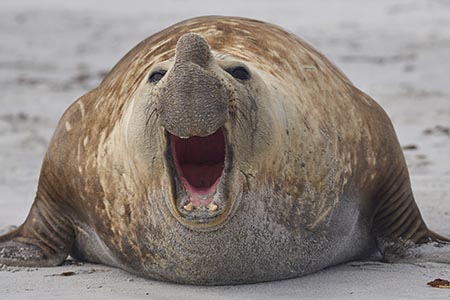
Southern elephant seal
A massive outbreak of bird flu, specifically the H5N1 strain, has caused an alarming decline in the world’s largest seal species, the southern elephant seal. Once primarily a concern for poultry and wild birds, avian flu has been detected in dairy cows and a few humans, and now poses a threat to wildlife to an extent that has caught many scientists by surprise. Sea lions and even the mighty, four-ton southern elephant seal can be laid low by this tiny, but potent virus.
Southern elephant seals are enormous, solitary ocean dwellers that gather by the thousands each year along the Patagonian coast to breed. In 2023, this annual gathering turned grim as researchers encountered widespread seal deaths on the beaches. Hundreds of adults and newborn pups were found dead, a drastic and deeply disturbing change from previous years. The virus did not stop with just elephant seals; tens of thousands of sea lions in Peru and Chile, as well as seals and sea lions in Argentina, also died in large numbers. At Argentina’s Peninsula Valdés, almost the entire cohort of elephant seal pups perished. This catastrophic event slashed local seal numbers and signaled a threat to the broader ecosystem.
The effects of the outbreak continue to unfold globally. Researchers now face the challenge of understanding how the virus travels between bird and mammal populations, with seabirds suspected as a key vector. Large-scale mortality events may not capture the full scope of avian flu’s impact since we don’t know what is happening in remote places. But we can see that consequences for southern elephant seals are profound. The population at Peninsula Valdés dropped by 60 percent, with adults and new pups both severely reduced. This dramatic loss could move the species from "Least Concern" to "Endangered" on the global conservation list. Longer-term recovery is uncertain, and some scientists estimate it could take many decades for populations to rebound – and that is if there aren’t any more outbreaks or environmental pressures on the species.
As with any massive change in population, the southern elephant seal’s sudden decline disrupts entire ocean food webs. As apex predators and nutrient distributors, their loss affects many other species and alters ecosystem dynamics. This situation underscores a new and unexpected dimension to avian flu: it’s not just about protecting our food supply, but a potential ecological disaster, as well.
Sources: 'It was a horrible scene to witness': How bird flu has decimated elephant seal populations
Japan Enlisting Beagles to Sniff Out Invasive Fire Ants

A Beagle's nose can pick up scents you couldn't even imagine
Fire ants, which originally hail from South America, have become a notorious invasive species in the southern United States, outcompeting native ants and causing widespread ecological disruption. And their journey didn’t stop here – these ants stowed away on cargo ships to Australia, and from there, spread further into Asia, often going unnoticed in wooden pallets. While we would never go so far as to call an animal “evil,” fire ants are, inarguably, a huge pain in the backside (or in any other part of your body they choose to bite or sting), and nobody who lives in a fire ant-free locale wants to see them move in. Ever.
Japan, in an effort to keep fire ants away, has enlisted man’s best friend, and will soon deploy specially trained Beagles to sniff out the unique scent of these ants. The noses of these dogs are so sensitive, they can detect fire ants even when they’re hidden deep within shipping containers. This method has already proven effective in Taiwan. Japan’s Beagle forces are set to begin operations early next year – which is not a moment too soon, as fire ants were detected in two separate Japanese ports in a period of only two days last September. With dogs joining the fight, Japan hopes to avoid the costly lessons of the US and Australia, where dealing with fire ants costs hundreds of millions of dollars a year, and to catch these invasive pests before they make themselves a new – and permanent – home.
Sources: Japan unleashes beagles in battle against deadly fire ants
Polar Bear Mauling, Hoarded Dogs, and More!

Goodnight.
In a tragic news bite out of the Arctic, a Canadian man, Christopher Best, was mauled to death by two polar bears only two days into his new job at a radar site in Brevoort Island, Nunavut. Best had left the site and was taking pictures of a polar bear when a second bear appeared behind him, cutting off his return path to the building. At that point, the mauling began, and Best was dead before his coworkers could drive the bears off. He had previously been posting pictures of bears to social media (he was an excellent photographer), and had apparently spoken with his family, telling them to stop worrying about him just prior to the attack. This is a grim example of the old bear safety advice rhyme: "If it's brown, lie down. If it's black, fight back. If it's white, goodnight" – which, while not entirely accurate, serves as a reminder of your fate once a polar has decided to attack you.
In somewhat more pleasant news out of the Arctic, scientists have discovered that Narwhals find hydrophones utterly irresistible. In a two-year study of underwater acoustics – one that was, perhaps ironically, intended to be as unobtrusive as possible – narwhals were recorded interacting with the scientists’ hydrophones at least 247 times, and appeared enchanted with the recording devices. They just loved those things! Inughuit hunters, who had helped place the hydrophones, joked that the narwhals were using the devices as backscratchers, and honestly, that’s as good an explanation as any. We really can't say for sure why Narwhals. find the scientists' hydrophones so fascinating. Unfortunately for the researchers, this suggests that even the stealthiest means of recording may be detected by animals and lead to “unnatural” changes in behavior. Though really, playing with a live microphone seems like fairly natural behavior to us.
The cause of death for the Delhi Zoo’s lone African elephant, Shankar, has been revealed: the Encephalomyocarditis (EMCV) virus. Shankar died suddenly last September, with all signs pointing toward heart failure. As EMCV can seriously damage the heart, the cause of death now makes a lot of sense – normally, you don’t expect an otherwise healthy 29-year-old elephant to just wake up one morning and drop dead. EMCV is carried by rodents and the virus can easily be spread in zoos or among swine... and the more rodents you have on site, the larger the risk to the animals you are keeping. This is part of why proper sanitation and rodent control is such a vital part of keeping animals. It's so much healthier and safer for the animals. And aside from the care and welfare concerns is the simple pragmatic truth that reducing the risk of potentially fatal viruses removes an avenue of attack from the animal rights zealots who don't want you to keep animals at all (don't worry about getting bored, they'll still find other ways of going after you).
In Nash County, North Carolina, a woman was arrested for felony child abuse and cruelty to animals after authorities discovered over a dozen dead animals on her property. They later found her malnourished daughter as well, who was in similarly terrible condition. The child was taken to the hospital, and another 32 live animals (many of them also clearly neglected) were rescued from the property. Sadly, horrific scenarios like this seem to repeat themselves multiple times each week. We always have a number to pick from when doing the newsletter – the only reason we chose this one is because of how brutally it highlighted the way child and animal abuse are often intertwined, and how cases like this can affect an entire community.
Another hoarding case, this one in Florida, has a happier ending. A welfare check revealed a garage with 41 dogs – all of them related. Egads! At some point in the past, the garage’s owner had taken in two unfixed dogs to help out a friend. The unaltered dogs – as dogs will do – bred and had puppies. Then, before he was able to afford spaying and neutering surgeries for the new additions, those dogs bred, too, and… well… you get the idea. These are definitely not breeding practices we would recommend, but to the owner’s credit, it appeared he was working his hardest to keep the animals healthy, fed, and minimize their stress levels. But ultimately, 41 is just too dang many dogs, which led to malnourishment and fleas, and ultimately, an admission that he just couldn’t handle it. The dogs were taken in by the Halifax Humane Society, and according to them, were pretty healthy overall – which is amazing, all things considered.
Also in the News...
★ Three hospitalized in Wells Farm fire that killed pigs, chickens (Old Barns on Fire; First Responders; Dramatic Animal Rescue)
★ UK minister unveils plan to cut animal testing through greater use of AI (UK News; Animal & AI Research)
★ The Government vs. Animal Lovers (News & Views from the P'Nut Gallery)
★ Over 100 animals found living in deplorable conditions at home in New Jersey (Medical Emergency Reveals Major Hoarding Situation)
★ (Video) Virginia man gives animals a second chance, creates custom prosthetics (Awesome Animal Inventions; Art Meets Science)
★ How animals see the world (Cognitive Maps & Animal Behavior)
★ Convergent genome evolution shaped the emergence of terrestrial animals (Getting Out of the Water)
★ 7 Meaningful Ways to Support Animal Shelters During the Holidays (Holiday Helping Lists; Nothing Says Support Like Money, Time, and Skill)
Click here to see what is happening legislatively
